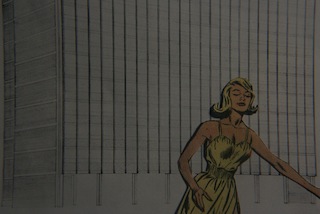Saturday, February 25, 2012, 8:00 pm, $6-$10
Mad Dance is a new showcase for films & videos that explore radical visions for madness in a culture that pathologizes difference. Tonight’s inaugural screening features three works that navigate the psycho-geography of the personal and the political. Curated by Ken Paul Rosenthal.
 The Accursed Mazurka (1994, 40”) by Nina Fonoroff
The Accursed Mazurka (1994, 40”) by Nina Fonoroff
The Accursed Mazurka uses the enveloping sound of music from movie melodramas and gothic radio plays plus a third-person, softly spoken voiceover to bind wildly diverse images: home movies, off-the-TV detritus, layered opticals with colors so delicate they look hand-tinted. The Accursed Mazurka is an excavation of female sexuality that loses its dangerous edge only when it shears off onto a neatly framed chronicle of therapeutic experience.” – Amy Taubin, The Village Voice
Nina Fonoroff’s films are a hybrid of collage, painting, and musical composition from sampled sound and cinema. Her work has been shown at numerous showcases, festivals, and museums in the US, Canada and Europe. The Accursed Mazurka won a Juror’s Choice Award at the Black Maria Film Festival, and an Honorable Mention at the Ann Arbor Film Festival. Fonoroff is a 1998-99 Guggenheim Fellow, and teaches at the University of New Mexico.
 Crooked Beauty (2011, 30”) by Ken Paul Rosenthal
Crooked Beauty (2011, 30”) by Ken Paul Rosenthal
“I learned more from Jacks McNamara’s insights than I had from reading any number of books on the subject. Her courage and activism may help to bring about an important paradigm shift in our cultural view of those who are mentally different, and this film is an important part of that effort. Ken Paul Rosenthal, with his gift for translating elusive mental states into powerful, poetic images, helps to bring McNamara’s insights to a wider audience, while also creating a work of filmed illuminated text, where what appears to be crooked reveals its inherent beauty.” – David Finkelstein, Film Threat
Ken Paul Rosenthal’s films weave personal and political narratives into natural and urban landscapes. He is the recipient of a Kodak Award for Cinematography, a SAMSHA Voice Award for his media work in mental health advocacy, and 10 festival awards for Crooked Beauty. The film has been invited to 31 film festivals, and presented in person at dozens of peer support networks, hospitals, universities, mental health symposia, and jails worldwide.
 Lethe (2009, 23”) by Lewis Klahr
Lethe (2009, 23”) by Lewis Klahr
“A straightforward narrative film by Klahr’s standards, Lethe is a pulpy melodrama that incorporates sci-fi B-movie elements into a story straight out of a Vincente Minnelli women’s picture. It also functions as one of Klahr’s most sophisticated enactments of the intertwining of Thanatos and Eros, as if the inanimate materials that he is bringing back to life wish to return to their natural state of dead calm.” – Chris Stults, Assistant Curator of Film/Video, The Wexner Center for the Arts
Lewis Klahr was called, “the reigning proponent of cut and paste” by critic J. Hoberman of the Village Voice. He is a master collagist whose uniquely idiosyncratic experimental films and cutout animations have been screened extensively in the United States and Europe. His work is in the permanent collection of the New York Museum of Modern Art, and was twice included in the Whitney Biennial. Klahr is a 1992 Guggenheim Fellow, and teaches at Cal Arts.
